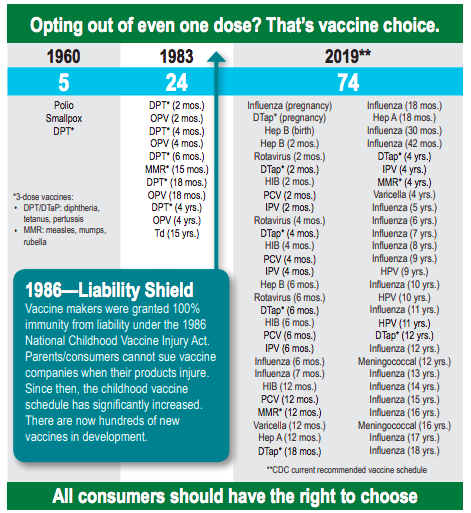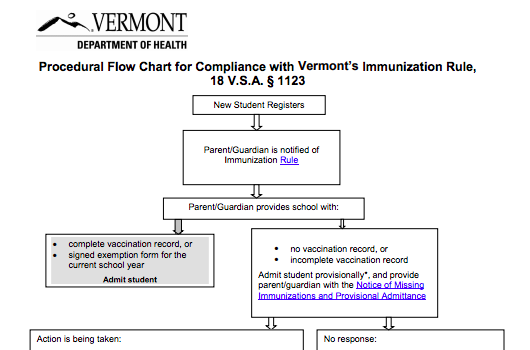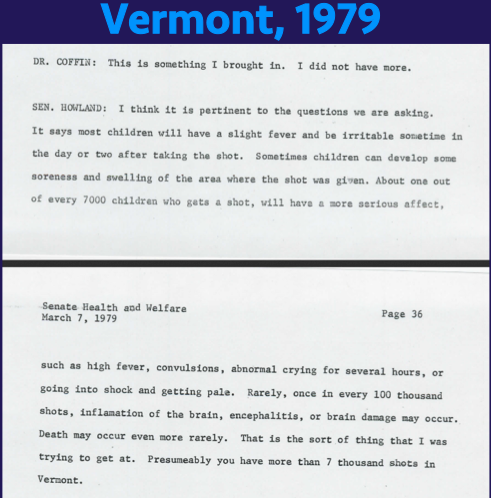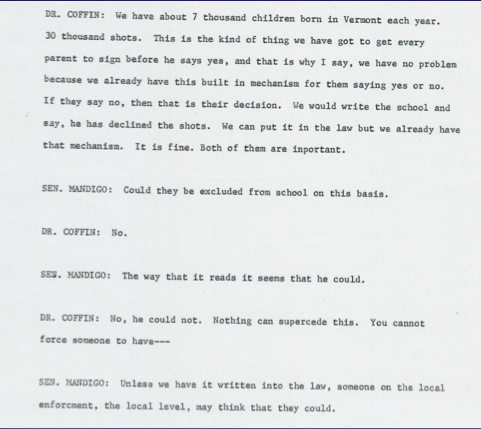Many people do not know that “exemptions” even exist, and do not appreciate their importance. It should really be law to be told it is your right to refuse. School vaccine laws in Vermont have an interesting history (you can read more about all of it, here), but basically:
In 1979, when VT’s school vaccine law was first enacted, the position of the Health Department was “of course parents should always have the choice” to take the risk. Back then there were only 3 shots generally recommended for school. There were no liability shields for doctors or school officials to hide behind. Exemptions were written into original law to protect the parent “right to hold moral, philosophical or religious objections”. It was at that time when so-called “exemptions” were guaranteed.
In 1986, Congress provided a liability shield for all involved in the process of vaccinating children. Parens cannot sue in a normal court fo law after vaccination causes disability or death. Since that time, the number of shots placed on the school recommended “schedule” has exploded. And then, in various stages beginning in 2007, 2011 and 2015, the drug industry began to place heavy pressure and invest in lobby and PR efforts w/ CDC at State legislatures including Vermont to add HPV shots and remove parent exemptions from laws, attempting to block the rights long held by parents.
In 2012, VT parents succeeded in VT to fight back and retain philosophical exemptions, but in 2015 the industry was back with more lobbyists, and the philosophical exemption was voted away by the VT Senate and then the House and the Governor (Shumlin). Multiple states faced cookie-cutter legislation and marketing/PR campaigns funded by industry front groups.
Current situation:
“Vermont’s Immunization Rule, adopted pursuant to 18 V.S.A. § 1123, applies to any child or student attending any center-based or family child care facility, public or independent kindergarten, elementary and secondary schools.” – More at: https://www.healthvermont.gov/sites/default/files/documents/pdf/ID_IZ_CCP_Religious_Exemption.pdf
“Vermont’s Immunization Rule, adopted pursuant to 18 V.S.A. § 1123, applies to undergraduate students enrolled in colleges and universities. Before entry, students must have the required immunizations unless exempt for medical or religious reasons. To claim either exemption this form must be completed and returned to the student health center prior to school attendance. Students who claim any exemption may be kept out of classes during a disease outbreak if it is determined that such students are at risk for getting that disease and transmitting it to other students. The length of time a student is excluded from classes will vary depending on the disease and can range from several days to more than a month.” – More at: https://www.healthvermont.gov/sites/default/files/document/ID_IZ_K12_College-Immunization-Exemption-2024.pdf
Although a protected, guaranteed right – exemptions are consistently the low hanging fruit that the drug industry would love to chop, since it would mean permanent mandates and profits despite glaring safety lapses and the devastatingly real potential for deterioration of health overall.
Some say, “vaccination should be mandatory.” They often do not contemplate the sheer number of vaccines, boosters and total shots this would mean for all children (and people as adults have just learned). This includes even those who have previously suffered from catastrophic reactions, since vaccine reactions are largely unacknowledged (therefore the shots are “safe”).
Health Choice VT advocates for the right to refuse, as a fundamental human right on the basis of informed consent – which is the right to know all of the risks, and the right to decline any medical intervention or injection, without being coerced.
Click here to view/download the EXEMPTION form for K-12
Click here to view/download the EXEMPTION form for College
Click here to view/download the Vermont MEDICAL EXEMPTION form
Every year bills to eliminate, restrict or expand state vaccine exemptions are introduced in multiple states. The National Vaccine Information Center is an excellent course of up-to-date information on state vaccine laws. Visit: nvic.org/law-policy-state.
Where to find the Laws
Vermont law recognizes religious vaccine exemptions. If a vaccine conflicts with your protected beliefs, submit this form in place of records. If your religious beliefs/exemptions are blocked or interfered with in any way, consider hiring an attorney before giving up. See full Title 18: Health Chapter 21: Communicable Diseases, which includes quarantine, tuberculosis, venereal disease, vaccine and communicable disease testing laws. School vaccine law for Vermont may be found in:
Subchapter 4: Immunization
- § 1120. Definitions
- § 1121. Immunizations required prior to attending school and child care facilities
- § 1122. Exemptions
- § 1123. Immunization rules
- § 1124. Access to and reporting of immunization records
- § 1125. Quality improvement measures
- § 1126. Noncompliance
- § 1127. Discrimination and testing prohibited
- § 1128. Access to health services and testing
- § 1129. Immunization registry
- § 1130. Immunization funding
- § 1131. Vermont Immunization Advisory Council
- § 1132. Vaccine Adverse Event Reporting System
Right now Vermont School Mandates “provide for religious exemptions.”
HPV shots for school??? If no religious exemption – then this would happen.
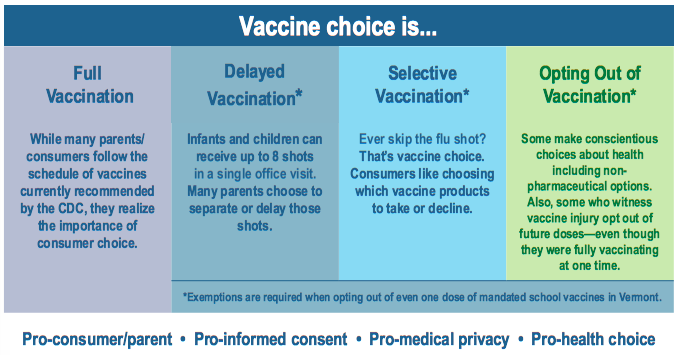
All Coronavirus-related state measures can be found here: https://www.lexisnexis.com/en-us/products/state-net/coronavirus-legislative-and-regulatory-updates.page#VTinfo.
Parents Beware: The long standing right of parents to hold “moral/philosophical beliefs opposed to vaccination” when sending children to get an education at school was banned by a “split” Vermont State Legislature (which reconsidered the next day) in 2015 and signed into law by former Gov. Shumlin, effective 2016. Your child still has the right to receive an education regardless of his/her vaccination status; however, certain private schools have been reported as blocking children unless they have been “fully vaccinated” (see chart below). Additionally, the State Health Department has been reported as advising schools to block all exemptions. If certain vaccines conflict with your protected beliefs, have this signed and submit it in place of your child’s vaccination record to the school requesting it: https://www.healthvermont.gov/sites/default/files/documents/pdf/ID_IZ_CCP_Religious_Exemption.pdf. If your religious beliefs are blocked, questioned, or interfered with in any way, please consider hiring an attorney.
In 2023, language was introduced that was enable vaccination of children without parental consent (read more here)
Nurses/Hospital Employees Beware: Hospital licenses are dependent upon a state law that sets forth: “All employees shall have such additional examinations, tests, and immunization treatments as the licensing agency may determine to be necessary in the public interest.” See: Licensing Of Hospitals (18 V.S.A. § 1905). Nurses will need to organize to protect rights.
*Read more at: How Does a Vaccine Get “Mandated” for School in Vermont?All Vermont VACCINE and “public health” laws: |
| 18 V.S.A. § 104b Community health and wellness grants |
| 18 V.S.A. § 991 Establishment of Birth Information Network |
| 18 V.S.A. § 1121 Immunizations required prior to attending school and child care facilities |
| 18 V.S.A. § 1122 Exemptions |
| 18 V.S.A. § 1123 Immunization rules |
| 18 V.S.A. § 1124 Access to and reporting of immunization records |
| 18 V.S.A. § 1129 Immunization registry |
| 18 V.S.A. § 1130 Immunization funding |
| 18 V.S.A. § 1131 Vermont Immunization Advisory Council |
| 18 V.S.A. § 1755 Universal screening |
| 18 V.S.A. § 1905 License requirements |
| 18 V.S.A. § 5087 Establishment of birth information network |
Title 18 : HealthChapter 003 : State Board Of Health(Cite as: 18 V.S.A. § 124)
|
| https://legislature.vermont.gov/statutes/search |
MINOR CONSENT (note that the passage of the constitutional amendment may obliterate parent consent and open up consent by children – open for debate)
from “Vermont Guide to Health Care Law” (VT Med. Soc. – begins on page 24):
What is the legal age of consent in Vermont? Eighteen (18) is the legal age of consent in Vermont. Individuals under the age of eighteen are minors under Vermont law. In most circumstances, minors are not capable of giving informed consent to their own medical care. Who can give informed consent to health care for a minor? Generally, only the following individuals may give informed consent to health care for a minor: A guardian or representative who has been appointed by a judge to make health care decisions for the child; A parent (adopted or biological). Can a minor ever give informed consent for his or her own health care? Yes, minors who are married or have ever been married and minors on active U.S. military duty may give informed consent to their own health care. 12 V.S.A. § 7151. Minors emancipated by a court order may also give informed consent to their own health care. Id. If a minor states that he or she has been emancipated by court order and is thus authorized to provide informed consent for a medical procedure, the health care provider should obtain a copy of the court order regarding emancipation and retain the court order in the patient’s medical record. To become emancipated, a probate court must determine that a minor: (1) is sixteen (16) years of age; (2) has lived separate and apart from his or her parents or legal guardians for at least three (3) months; (3) is managing his or her own financial affairs; (4) has demonstrated ability to be self-sufficient in financial and personal affairs; (5) holds a high school diploma or its equivalent or is earning passing grades in an educational program approved by the court and directed toward the earning of a high school diploma or its equivalent; (6) is not under a legal guardianship or in the custody of the Commissioner for Children and Families; and (7) is not under the supervision or in the custody of the Commissioner of Corrections. Id.
Are there any special situations where an unemancipated minor may give informed consent to their own health care? Yes, minors 12 years or older may give informed consent to treatment for sexually transmitted diseases (including HIV and AIDS), drug dependence, and alcoholism. 18 V.S.A. § 4226. But if a minor requires immediate hospitalization for treatment of any of these conditions, the parents must be notified of the hospitalization. Id. Minors 14 years or older may also voluntarily admit themselves to a hospital for mental health related treatment if they give informed consent in writing. Minors under 14 may admit themselves to a hospital for mental health related treatment by providing their own written informed consent and a written application from a parent or guardian. 18 V.S.A. § 7503. Minors of any age may give informed consent to medical treatment associated with rape, incest, or sexual abuse. Health care providers are required to report such incidents to the Department of Children and Families (“DCF”) within 24 hours. 33 V.S.A. § 4911 et seq.
Who can give informed consent for HPV vaccinations of an unemancipated minor? Informed consent from a parent or guardian should be obtained before administering an HPV vaccine to a minor. Although HPV is a sexually transmitted disease (“STD”), it is unclear whether the vaccine for the HPV is considered a “treatment” for an STD. Thus, it is unlikely that the HPV vaccine falls within the Vermont statutory exception permitting minors 12 years or older to give informed consent to treatment for STDs. See “
Are there any special situations where an unemancipated minor may give informed consent to their own health care?”, above, and 18 V.S.A. § 4226.
As a result, as with other vaccines, health care providers should obtain informed consent from a parent or guardian before administering the HPV vaccine to minors. Further, in addition to obtaining informed consent from a parent or legal guardian for the vaccination, health care providers must give the parents or legal representatives of a child a separate Vaccine Information Sheet (“VIS”) prior to administering every dose of the HPV vaccine. 42 U.S.C. § 300aa-26(d) (Emphasis added) see also Centers for Disease Control and Prevention, Vaccine Information Statements: Frequently Asked Questions, https://www.cdc.gov/vaccines/hcp/vis/about/vis-faqs.html (last visited January 9, 2017).
Per the federal National Childhood Vaccine Injury Act (“NCVIA”), if the parent/legal representative is present at the time of the HPV vaccination, the VIS must be provided to the parent/legal representative. If the parent/legal representative is not present at the time of the vaccination (e.g., the minor has driven him or herself to the appointment), the provider must provide the legal representative with a VIS prior to vaccination (i.e., before the minor arrives to receive the vaccination) and the VIS must be coupled with a method to acknowledge receipt/review of the VIS (e.g., adding a written statement that the parent/legal representative received and reviewed the current edition of the VIS, with the edition date specified, on the medical consent form authorizing vaccination).
Who can give informed consent to health care when the minor’s parents are divorced? In general, both parents can make health care decisions for the child. If the parents are divorced, the informed consent of either parent may be assumed to be sufficient. That said, every divorce decree is different and there are situations where a judge has entered an order in which one or both of the parents is no longer authorized to make health care decisions for their child. In those situations, health care professionals are obligated to follow the judge’s order. If one parent claims that he or she has exclusive control of medical decision-making, he or she should be asked to present relevant family court documents.
Can a parent or guardian delegate authority for giving informed consent to medical treatment for a minor? Vermont law is silent on this question. It is reasonable to assume that where the parent(s) or guardian(s) will not be reasonably available to give informed consent to medical treatment (e.g., vacations, illness, etc.), they may delegate this authority to a selected adult. Because there are no clear guidelines for determining the legality of an apparent delegation of this parental authority, providers should make reasonable efforts to obtain parental informed consent and should use their professional judgment and exercise greater caution in providing services involving any increased risk. If the office has a written consent on file that has been signed by the parent authorizing the health care provider and his/her staff to provide medical care to the child, there is little or no risk in providing the child with routine medical care. In situations where the treatment is non-routine or poses some degree of risk to the child, it is always advisable to consult with the parent before proceeding. Asking parents ahead of time to document authorization for medical treatment in their absence is recommended.
When faced with a situation where the minor has been brought to the office by a grandparent or adult sibling, should a provider refuse treatment until informed consent from the parent/guardian has been obtained? No. As long as the health care provider has exercised due care and made a good faith determination that the grandparent or adult sibling has been authorized by the child’s parent or guardian to act as the agent in obtaining medical care for the minor, liability is unlikely if the parent later claims that the grandparent or sibling lacked authorization. That said, if the medical care will involve anything more than routine, low-risk procedures, the health care provider should make every effort to obtain the parent’s specific informed consent before providing this type of care. Health care providers are expected to use good judgment in determining which procedures require specific parental informed consent.
The following language is on the Vermont exemption form:
“Children/students with an immunization exemption may be kept out of child care or school during the course of a disease outbreak if it is determined that such children/students are at risk for getting that disease and transmitting it to other children/students. The length of time a child/student is excluded will vary depending on the disease and can range from several days to more than a month.”
Vermont statutes:
18 V.S.A. § 1126 (immunization noncompliance)
The school board of each district, or the board of trustees of each independent school, or the chief executive officer of each postsecondary school, or the director of each child care facility shall exclude from school or a child care facility any person not otherwise exempted under this subchapter who fails to comply with its provisions. No person shall be excluded for failure to comply with the provisions of this subchapter unless there has been a notification by the appropriate school or child care facility authority to the person, or in the case of a minor, to the person’s parent or guardian of the noncompliance with this subsection, and of their rights under section 1122 of this title. In the event of exclusion, school officials or the director of the child care facility shall notify the Department of Health and contact the parents or guardians in an effort to secure compliance with the requirements of this subchapter so that the person may attend school or the child care facility. (Added 1979, No. 40; amended 1981, No. 18, § 5; 1993, No. 75, § 2; 2007, No. 204 (Adj. Sess.), § 10.)”
18 V.S.A. § 126 (Health orders)
(a) The Commissioner or the selectboard may issue a health order to: (1) prevent, remove, or destroy any public health hazard; (2) mitigate a significant public health risk; (3) correct any violation of this title or any rules promulgated thereunder; or (4) correct any violation of a permit restriction or requirement. (b) The issuing authority for a State health order shall be the Commissioner. The issuing authority for a local health order shall be the selectboard… (more)
18 V.S.A. § 1004 (Report by physician; quarantine)
A physician who knows or suspects that a person whom he or she has been called to attend is sick or has died of a communicable disease dangerous to the public health shall immediately quarantine and report to the health officer the place where such case exists, but if the attending physician, at the time of his or her first visit, is unable to make a specific diagnosis, he or she may quarantine the premises temporarily and until a specific diagnosis is made, and post thereon a card upon which the word “quarantine” should be plainly written or printed. Such quarantine shall continue in force until the health officer examines and quarantines as is provided in this title.
18 V.S.A. § 112 (Circulars of information)
The Board shall prepare and distribute to local boards of health, physicians, and other persons such printed circulars as it deems necessary and such rules as the Board may adopt and, upon request of the Board, the Commissioner thereof shall give information relative to the cause and prevention of disease and directions as to modes of management, quarantine, and means of prevention of contagious and infectious diseases. (Amended 1959, No. 329 (Adj. Sess.), § 27, eff. March 1, 1961; 2015, No. 23, § 105.)
18 V.S.A. § 1004a (Quarantine)
The Commissioner of Health shall have the power to quarantine a person diagnosed with or suspected of having a disease dangerous to the public health. (Added 1979, No. 60, § 2.)
SCHOOL LIST OF VACCINE DOSES (2020) – from “immunization rule“
vaccine number of doses
LINKS TO EXEMPTION FORMS:
Child Care and Schools:
- Religious Exemption Form must be signed by the parent annually.
- Medical Exemption Form must be filled out by your health care provider.
Colleges:
HISTORY:
Vaccination of school children has ALWAYS been a voluntary procedure for all in Vermont, even during times of smallpox and polio. In 1979, the first law ever enacted impacted schoolchildren, but recognized the rights of parents and codified those rights into the law, by allowing for “exemptions” – both religious and conscientious (they termed it moral/philosophical back then).
However, Vermonter’s philosophical exemption rights were abolished in July 2016. The legislature has granted the power to decide what vaccines get mandated, to the Health Commissioner.
Since there is no Federal or State requirement for informed consent relating to immunization, and since doctors, public health officials and manufacturers cannot be held accountable for damage caused by vaccine products, our precious philosophical exemption is all that we have left as a safety valve to protect our children. We are wondering what your administration expects from the affected families of the school children who currently use the philosophical exemption. What should they do? Should they lie and claim religious exemptions? Should they quit their jobs and home school their children? Should they leave Vermont?”
– excerpt from letter to Vermont Governor Peter Shumlin, May 14, 2015.
18 V.S.A. § 1122. Exemptions: (a) A person may remain in school or in the child care facility without a required immunization: (1) If the person, or in the case of a minor the person’s parent or guardian presents a written statement from a licensed health care practitioner, health clinic, or nurse that the person is in the process of being immunized. The person may continue to attend school or the child care facility as long as the immunization process is being accomplished; (2) If a health care practitioner, licensed to practice in Vermont, certifies in writing that a specific immunization is or may be detrimental to the person’s health or is not appropriate; (3) If the person, or in the case of a minor the person’s parent or guardian states in writing that the person, parent, or guardian has religious beliefs opposed to immunization* (b) The health department may provide by rule for further exemptions to immunization based upon sound medical practice.
*6.2 Religious Exemptions: A person may remain in a child care facility or school without a required immunization if the person or, in the case of a child, the person’s parent or guardian, annually provides a signed statement to the child care facility or school on a Department-published form, indicating that the person, parent, or guardian: 6.2.1 holds religious beliefs opposed to immunizations; and 6.2.2 has reviewed the evidence-based educational material provided by the Department regarding immunizations, including: 6.2.2.1 the information about the risks of adverse reactions to immunization; 6.2.2.2 the information that failure to complete the required vaccination schedule increases risk to the person and others of contracting or carrying a vaccine-preventable infectious disease; and 6.2.2.3 the information that there are persons with special health needs attending schools and child care facilities who are unable to be vaccinated or who are at heightened risk of contracting a vaccine-preventable communicable disease and for whom such a disease could be life-threatening. 6.3 Any child care facility or school receiving a form as required by this section shall store the form as part of the child’s or student’s immunization record.
LINK TO PARENT FORMS:
- College Exemptions Form
- Religious Exemption Form (2019-2020)
- Varicella Disease (Chickenpox) Documentation
- Medical Exemption Form
BACKGROUND
In 1979, school vaccine recommendations were put into place – but at that time, Vermont parents’ rights were carefully – and deliberately – protected against medical and drug industry interests. At that time, doctors and schools wanted to guard against potential lawsuits. So, forms were prepared. Those declining the procedure file what is called an “exemption.”
The form used in Vermont from 1979 -2012, included an area for parents to sign. It read:
I request that following immunization(s) be waived because they conflict with my free exercise of religious, moral or philosophic rights.”
Choice Matters.
Vermont citizens have long-held reservations against compulsory vaccination. For more than a century, (and long before the industry was indemnified from product liability – in 1986), this debate has been quite active.
For example, in 1912, there was a “Vigorous Discussion Over Vaccination” (in the era of smallpox) that was captured in the Barre Daily Times, November 15, 1912. VACCINES WERE NEVER MADE COMPULSORY – EVEN THEN.
One can also read about the grave concerns expressed by citizens like F.E. Simpson of Glover, Vermont: He warned about our fundamental rights and liberties being at risk due to medical politics (see the Orleans County monitor, January 12, 1921).
NOT UNTIL 1979 WERE THE FIRST ‘MANDATES’ PUT INTO PLACE
In more recent times, there was Marcia Bruno’s insistence that parents have the ultimate choice when it comes to vaccination for their children. She wrote her letter as the state board of health and pediatricians were pushing for mandatory school vaccination laws in 1979. Marcia Bruno’s plea ended in a vote that added broad discretion in vaccine decision-making for Vermont parents in 1979.
In 1979, “Moral Exemptions” and “Religious Exemptions” were built into the original “school immunization” law in Vermont. Lawmakers and doctors respected that parents must always reserve the right not to inject a serum into their children, whether they are religious or not, because the product could cause harm. In reviewing the legislative history of the original 1979 law, Dorian Yates and I found a couple things of interest:
- Even after 294 cases of measles in the state the year prior, the wise lawmakers of that time still included the right for a parent to say no based on religious beliefs or moral (philosophical) convictions; and
- Lawmakers at that time knew that lawsuits were possible. Lawsuits against the state, town school districts, drug makers, doctors, and school boards were all identified as possible – if a child were to have a bad reaction. The potential for these reactions was openly discussed. This liability was yet another reason why lawmakers at the time emphatically objected – unless parental choice was built into the law.
Click here to view/download the original “exemption” form, which said:
Just seven years later, in 1986, Congress passed the National Childhood Vaccine Injury Act, shielding vaccine manufacturers and doctors from civil product liability and malpractice lawsuits when a permanent disability or death is caused by a vaccine.
If the AAP and CDC’s vaccine “recommendations” are CHANGED FROM VOLUNTARY TO MANDATORY (no exemptions), babies born today will be expected to have more than 50 injections by age 18. This is seven times the number of injections recommended in 1983, before industry was freed from liability for product harm.
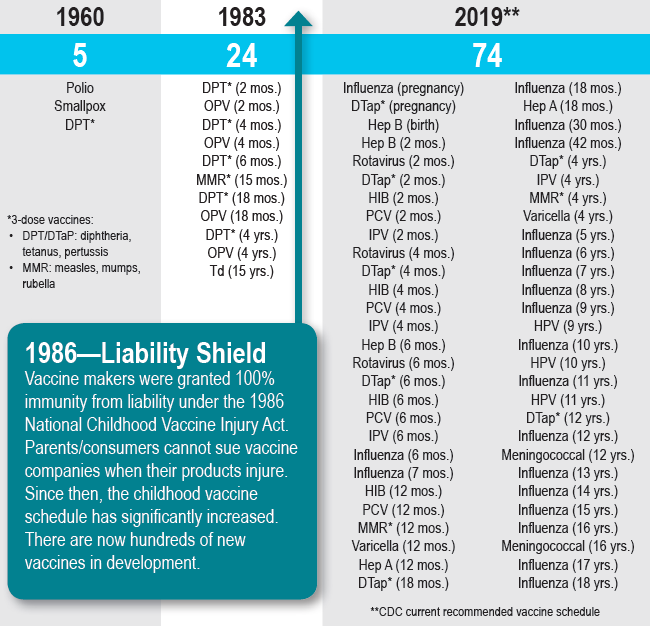
It is our position that all people and parents should always have the right to say “no thank you” to a liability-free vaccine injection.
In 2007, Merck and some legislators tried, but failed, to mandate the HPV vaccine for school entry in Vermont. At that time, “Moral Exemptions” were re-named to “Philosophical Exemptions.”
In 2011 a rise in the number of parents filing philosophical objection forms was noticed. Hepatitis B vaccine and chicken pox vaccine rates were not high enough and a message was stirred in the media: “dangerous”drop in vaccination rates”.
In 2012, parent’s rights to file “Philosophical Exemptions” were upheld in a vote of 133-6. At that time, the Vermont legislature displayed an overwhelming support for parental choice in such medical decision-making. However, the first signs of government coercion emerged with their new claims of “putting others at risk” and “vaccines only work if we all get them”, misinformation on educational material, and discriminating statements on forms that at one time, recognized parents’ free rights.
In 2015, using a national campaign to spread fear of measles, and after intense lobbying by pharma and the medical industry, “Philosophical Exemptions” were deleted from Vermont law on July 1, 2016. Hearings were mirrored on the same days in California, whose parents also lost their rights. Some discussion was had as to whether the government could “qualify” someone’s religion.
Today “Religious Exemptions” remain available to Vermont parents. However, since 2016 area Catholic schools have reportedly refused to accept parent religious vaccine exemptions, discriminating against those not vaccinated exactly to the government’s schedule. We have also received reports of schools scrutinizing medical exemptions, with involvement of the health department; some medical exemptions have been “rejected.” Some pediatric practices discriminate against and refuse to care for children who are not vaccinated. It is strange to have to ask permission to say no from the person that is supposed to be providing free and informed consent, without coercion. Schools are caught in the middle, and school nurses are being used by the industry to push vaccines and to track product uptake.
Medical exemptions are currently protected in law, but as we have seen, “anything goes”. Parents who could not get medical exemptions used to file philosophical exemptions.. Many families have reported being unable to get medical exemptions and have either homeschooled or left the state. In general, pediatricians refuse to acknowledge or make any connection between vaccines and their side effects, otherwise, they might expose themselves for failure to warn / failure to provide vaccine informed consent by delivering the warnings contained on the package inserts.
It is critical to have consent and choice in a free society.
Click here to view/download the Vermont RELIGIOUS EXEMPTION form.
Click here to view/download the Vermont MEDICAL EXEMPTION form.
The right to informed consent to any medical intervention that can kill or injure you or your child is a human right.
Consider for example the United Nations Universal Declaration on Bioethics Article 6 – Consent, – which states:
1. Any preventive, diagnostic and therapeutic medical intervention is only to be carried out with the prior, free and informed consent of the person concerned, based on adequate information. The consent should, where appropriate, be express and may be withdrawn by the person concerned at any time and for any reason without disadvantage or prejudice.
2. Scientific research should only be carried out with the prior, free, express and informed consent of the person concerned. The information should be adequate, provided in a comprehensible form and should include modalities for withdrawal of consent. Consent may be withdrawn by the person concerned at any time and for any reason without any disadvantage or prejudice. Exceptions to this principle should be made only in accordance with ethical and legal standards adopted by States, consistent with the principles and provisions set out in this Declaration, in particular in Article 27, and international human rights law.
3. In appropriate cases of research carried out on a group of persons or a community, additional agreement of the legal representatives of the group or community concerned may be sought. In no case should a collective community agreement or the consent of a community leader or other authority substitute for an individual’s informed consent.”
written by: Jennifer Stella
